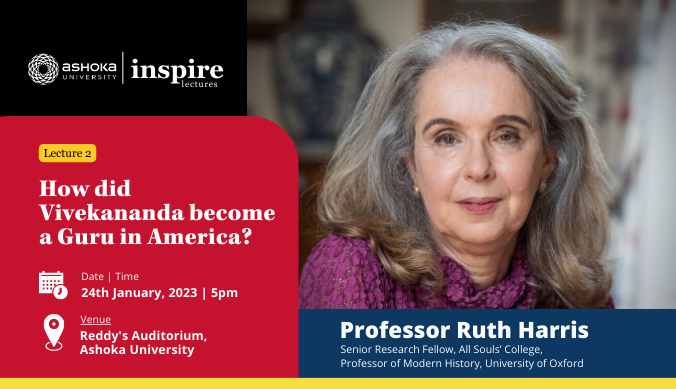Interdisciplinarity, the belief that knowledge has no boundaries, has been a foundational premise in the growth of human knowledge. The Ashoka University Inspire Lectures is a series of talks on the theme of Interdisciplinarity by distinguished speakers for Ashoka and the World.
The second lecture of the series is by Professor Ruth Harris, a Senior Research Fellow at All Souls’ College, and Professor of Modern History at the University of Oxford. She has been awarded a Guggenheim Fellowship for research in French History and the Wolfson History Prize for her work. In 2011, Professor Harris was elected a Fellow of the British Academy (FBA), the UK’s national academy for the humanities and the social sciences. She has published widely in the history of science and medicine, history of gender and religion, and the history of politics and emotion.
In this lecture, Professor Harris will talk about ‘How did Vivekananda become a Guru in America?’. Vivekananda is a seminal figure of the global nineteenth-century, but the pattern of his fame does not match his influence. Here he is a household name, but in the west few have heard of him. Why this is so goes to the heart of his life, his ideas, and his programme. I want to explain why he both challenged and enticed so many different audiences, from respectable New Englanders to Swadeshi activists. Rather than reinforcing the tired vision of Vivekananda as the first to unlock eastern spirituality for a materialist west, I want to focus on the paradoxes and uncertainties of his teachings. I will also investigate his relationship to nationalism, anti-colonialism, and Karma yoga. However, I will reinterpret his impact by integrating the “Indian Vivekananda” with the “global guru” by reconsidering his relationship to women, global intellectual history, and universalism in the fin-de-siècle world.
LINK TO REGISTER – https://forms.gle/GjTmNXW7Xp3hUUBcA
Date and Time:
24th January, 2023 | 5pm
Venue:
Dr. Reddy’s Auditorium, Ashoka University







